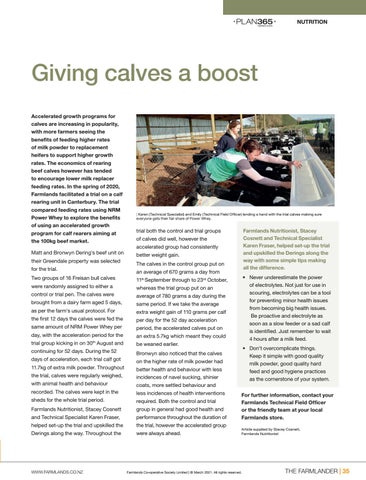NUTRITION
Giving calves a boost Accelerated growth programs for calves are increasing in popularity, with more farmers seeing the benefits of feeding higher rates of milk powder to replacement heifers to support higher growth rates. The economics of rearing beef calves however has tended to encourage lower milk replacer feeding rates. In the spring of 2020, Farmlands facilitated a trial on a calf rearing unit in Canterbury. The trial compared feeding rates using NRM Power Whey to explore the benefits of using an accelerated growth program for calf rearers aiming at the 100kg beef market. Matt and Bronwyn Dering's beef unit on their Greendale property was selected for the trial.
| Karen (Technical Specialist) and Emily (Technical Field Officer) lending a hand with the trial calves making sure everyone gets their fair share of Power Whey.
of calves did well, however the accelerated group had consistently better weight gain. The calves in the control group put on an average of 670 grams a day from
Two groups of 16 Freisan bull calves
11th September through to 23rd October,
were randomly assigned to either a
whereas the trial group put on an
control or trial pen. The calves were
average of 780 grams a day during the
brought from a dairy farm aged 5 days,
same period. If we take the average
as per the farm's usual protocol. For
extra weight gain of 110 grams per calf
the first 12 days the calves were fed the
per day for the 52 day acceleration
same amount of NRM Power Whey per
period, the accelerated calves put on
day, with the acceleration period for the
an extra 5.7kg which meant they could
trial group kicking in on 30th August and
be weaned earlier.
continuing for 52 days. During the 52
Bronwyn also noticed that the calves
days of acceleration, each trial calf got
• Never underestimate the power of electrolytes. Not just for use in scouring, electrolytes can be a tool for preventing minor health issues from becoming big health issues. Be proactive and electrolyte as soon as a slow feeder or a sad calf is identified. Just remember to wait 4 hours after a milk feed. • Don’t overcomplicate things. Keep it simple with good quality milk powder, good quality hard feed and good hygiene practices as the cornerstone of your system.
on the higher rate of milk powder had
11.7kg of extra milk powder. Throughout
better health and behaviour with less
the trial, calves were regularly weighed,
incidences of navel sucking, shinier
with animal health and behaviour
coats, more settled behaviour and
recorded. The calves were kept in the
less incidences of health interventions
sheds for the whole trial period.
required. Both the control and trial
Farmlands Nutritionist, Stacey Cosnett
group in general had good health and
and Technical Specialist Karen Fraser,
performance throughout the duration of
helped set-up the trial and upskilled the
the trial, however the accelerated group
Derings along the way. Throughout the
were always ahead.
WWW.FARMLANDS.CO.NZ
Farmlands Nutritionist, Stacey Cosnett and Technical Specialist Karen Fraser, helped set-up the trial and upskilled the Derings along the way with some simple tips making all the difference.
trial both the control and trial groups
For further information, contact your Farmlands Technical Field Officer or the friendly team at your local Farmlands store. Article supplied by Stacey Cosnett, Farmlands Nutritionist
Farmlands Co-operative Society Limited | © March 2021. All rights reserved.
THE FARMLANDER | 35
